Afghanistan coach Andy Moles on the 'most dangerous job in sport'
- Published
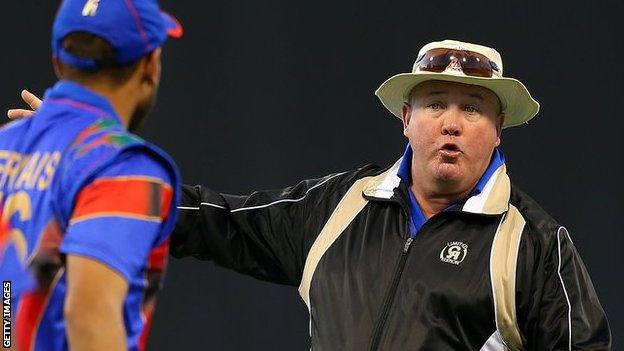
Andy Moles was named Afghanistan head coach in September 2014
Andy Moles has had three previous international coaching jobs, but his brother didn't want him to take the fourth.
The reason? Moles is in charge of Afghanistan and his brother works in counter-terrorism.
"He wasn't very happy," the former Warwickshire batsman told BBC Sport.
"He's still not happy about the time I spend in Kabul because he hears all the dark things that are happening there."
The rise of the Afghanistan cricket team is perhaps the greatest success story of modern sport.
A country that has been involved in one conflict or another since 1978 properly began its cricketing journey in 2008, competing against the likes of Jersey in the fifth and bottom tier of the International Cricket Council's world league.
Now, on a sunny Tuesday afternoon in Canberra, they are preparing for their World Cup debut against Bangladesh at 03:30 GMT on Wednesday, with Moles, appointed in September last year, at the helm.
The obvious question to pose to the 54-year-old was how did he come to take a job in one of the most dangerous countries on the planet?
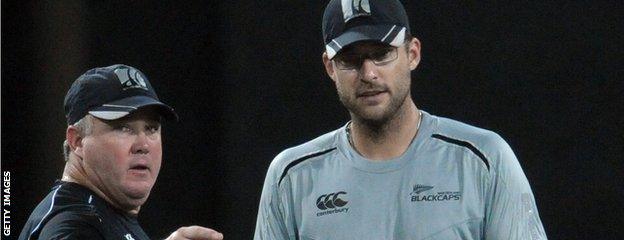
Andy Moles resigned after 11 months as New Zealand coach in 2009, citing differences between himself and senior players
"I was originally approached to do some batting consultancy work," the former New Zealand, Kenya and Scotland coach said. "I went to Kabul for three weeks and worked as an advisor.
"Six weeks later, head coach Kabir Khan decided he'd had enough of the travelling and that he wanted to spend more time with his family, so they asked me to take the job.
"I couldn't resist the opportunity to work at international level again and the World Cup was the cherry on the cake."
In a cricketing context, you can't fault his logic. Along with Ireland, Afghanistan are the strongest of the Associate members of the ICC, the level just below the teams that play Test cricket.
They had already qualified for the World Cup and will soon have the chance to earn Test status.
But, the UK foreign office advises against all but essential travel to Afghanistan. On its website, it lists nine attacks on western civilian targets, many of them fatal, in Kabul alone since January last year.
"I go to Kabul 10 days to two weeks before each tour, but I don't live there," said Moles, a former batsman who scored more than 15,000 first-class runs.
"I just go in and out depending on the touring commitments.
"I stay in a hotel which has got heavy security. I go backwards and forwards to the ground, then back to the hotel.
Andy Moles |
|---|
Age: 54 |
Playing career: 1986-97. Role: Opening batsman. |
Teams: Warwickshire, Griqualand West (SA) |
Average: 40.7. |
Teams coached: Griqualand West, Kenya, Scotland, Northern Districts (NZ), New Zealand, Afghanistan. |
"I don't go out at night, I don't go out on to the streets. The only time I leave the hotel is to go to work. When I come back, I close the door and have room service in the evenings."
Not ideal, but Moles has a grip of life in the Afghan capital, even if he says he might have a "false sense of security".
That leaves the actual coaching, which comes with its own challenges. Some problems, like language and resources, would not be unusual for an Englishman working with an Associate nation.
Afghanistan, though, have the issues of a country that has been ravaged by war for more than 35 years. Captain Mohammad Nabi, for example, grew up in a refugee camp.
"The hardships that the players and the general public in Afghanistan have gone through are well documented," said Moles.
"But, what impressed me was their all-round passion and their desire to win games of cricket. Whoever they play against, they go on the field and believe they can win.
"They are on a great journey, making remarkable strides. I see a genuine growth, month by month."
In a divided country, cricketing is a unifying force, not least because of stories like Nabi's.
When Afghanistan qualified for the World Cup in 2013, fans took to the streets of Kabul and Kandahar to celebrate.
"I can't stress enough how much the players know that, through good performances, there would be a massive uplift of the general well-being in the country," said Moles.
It is the likes of all-rounder Nabi, lively pace bowler Hamid Hassan and opening batsman Javed Ahmadi that give Afghanistan a real chance of marking their World Cup debut with a win.
Indeed, in the only one-day international they have ever played against Bangladesh, at the 2014 Asia Cup, Afghanistan won by 32 runs.
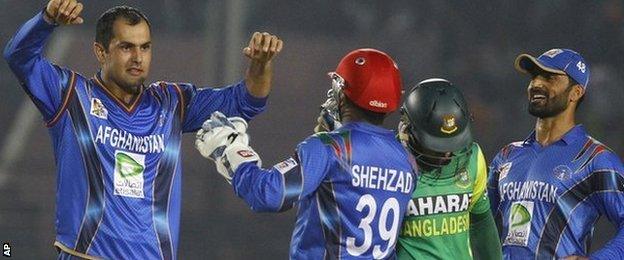
Afghanistan beat Bangladesh by 32 runs at the 2014 Asia Cup to record their first win against a Test-playing nation since the national team became a member of the International Cricket Council in 2001.
"Bangladesh can look forward to a very hard game," said Moles. "We will compete and, if we do the right things at the right time, we can get the right result.
"We are aware that Bangladesh are a Test side who have played a lot of cricket. We respect them, but we are not scared of them."
Even if Afghanistan do not record victory in their opener, there are five other opportunities for success in Pool A.
A meeting with Scotland is perhaps the best chance, while Australia, New Zealand and Sri Lanka should beware.
It is also quite easy to imagine a scenario where England might have to beat the Afghans in their final group game to reach the quarter-finals - a slippery prospect.
"The World Cup is a great opportunity and a great learning curve, but we are here to compete," said Moles,
"We're not just here to fulfil the fixtures. If we play good cricket, we will challenge every team that we play against.
"Are we nervous? No, we're excited."
All this was conducted under the gaze of a watchful media officer, who repeatedly called for the interview to be wound up.
In that sense, Afghanistan are already comfortable at cricket's top table.
If they carry that on to the pitch, Moles might have no choice but to go out in Kabul.
Listen to highlights from Test Match Special's and 5 live Sport's 2015 Cricket World Cup coverage
- Published18 February 2015
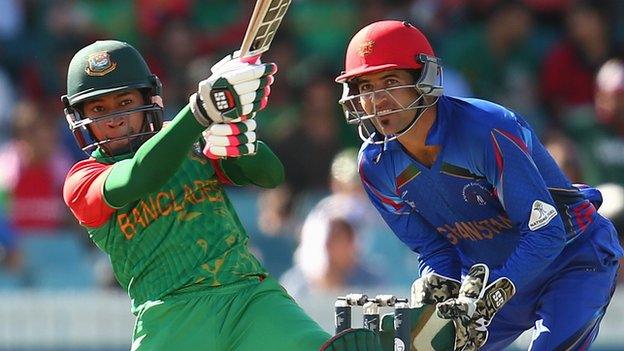
- Published17 February 2015

- Published17 February 2015
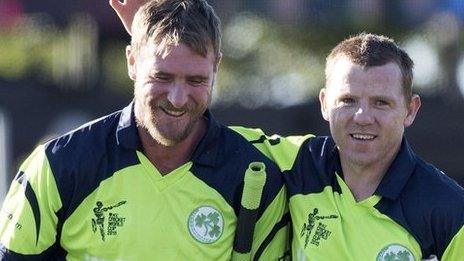
- Published16 February 2015
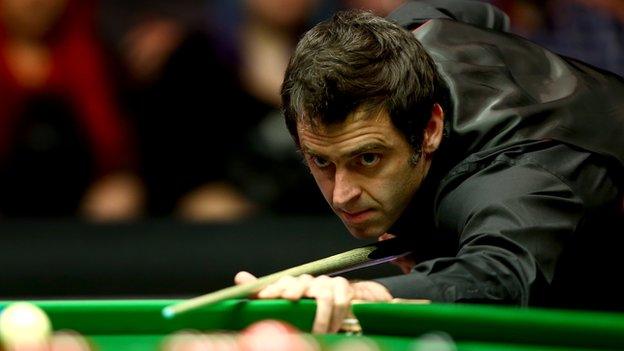
- Published30 July 2013

- Published15 May 2018

- Published18 October 2019
